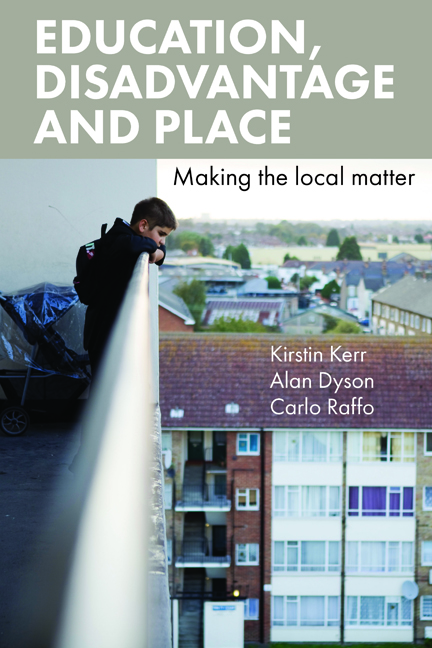Book contents
- Frontmatter
- Contents
- List of tables and figures
- Notes on authors
- Acknowledgements
- one Introduction
- two Why place matters in education
- three Local education systems as products of place: a case study
- four Learning from the past
- five Learning from the present
- six A rationale for a new generation of area-based initiatives
- seven Developing understandings of place as a basis for intervention
- eight Evaluation and monitoring
- nine Governance and accountability
- ten Children and places in hard times: some concluding thoughts
- References
- Index
two - Why place matters in education
Published online by Cambridge University Press: 25 February 2022
- Frontmatter
- Contents
- List of tables and figures
- Notes on authors
- Acknowledgements
- one Introduction
- two Why place matters in education
- three Local education systems as products of place: a case study
- four Learning from the past
- five Learning from the present
- six A rationale for a new generation of area-based initiatives
- seven Developing understandings of place as a basis for intervention
- eight Evaluation and monitoring
- nine Governance and accountability
- ten Children and places in hard times: some concluding thoughts
- References
- Index
Summary
As we argued in Chapter One, when it comes to achieving good outcomes across a range of domains, different places present different challenges and opportunities. An ecological conceptualisation of place can be used to help understand these. It can be used to help identify the factors and processes at work, at different spatial scales, which help to create and perpetuate poor outcomes in particular places. Following this, it can also invite some broad consideration of how area-based initiatives (ABIs) might intervene in relation to poor outcomes in particular places. We now want to apply these general arguments specifically to exploring the relationship between education, disadvantage and place in greater depth. In doing so, we will drill down from national analyses of educational outcomes data to consider a range of research evidence about how the factors and processes at work within local areas may relate to educational experiences and outcomes.
Spatial inequalities in education
To understand spatial inequalities in education, it is necessary to unpick the different dimensions of the relationship between education, disadvantage and place. First, as we saw in Chapter One, there is an unequivocal link between socio-economic disadvantage and poor education outcomes. Young people living in poverty, however defined, are more likely to achieve poor educational outcomes than their more advantaged counterparts (Cassen and Kingdon, 2007; OECD, 2008). A government survey of evidence from education, carried out by the Department for Children, Schools and Families (DCSF), concluded that ‘[economic] deprivation can have a large and pervasive impact on educational attainment’ (Schools Analysis and Research Division Department for Children, Schools and Families, 2009, p 6). In particular, it noted that gaps in cognitive development are evident from an early age, that schooling does little to reduce these gaps and that there are clear links from low attainment to reduced employment opportunities, poorer health outcomes and increased criminality.
Second, such evidence also shows that poor education outcomes and socio-economic disadvantage are spatially concentrated, and tend to be found together. For example, the DCSF reported that only 35% of pupils in the most disadvantaged areas in England reached nationally expected levels of attainment at the Foundation Stage in 2007, compared to 51% of pupils in more advantaged areas (Schools Analysis and Research Division Department for Children, Schools and Families, 2009). Similar patterns have also been found at a school level.
- Type
- Chapter
- Information
- Education, Disadvantage and PlaceMaking the Local Matter, pp. 31 - 46Publisher: Bristol University PressPrint publication year: 2014



